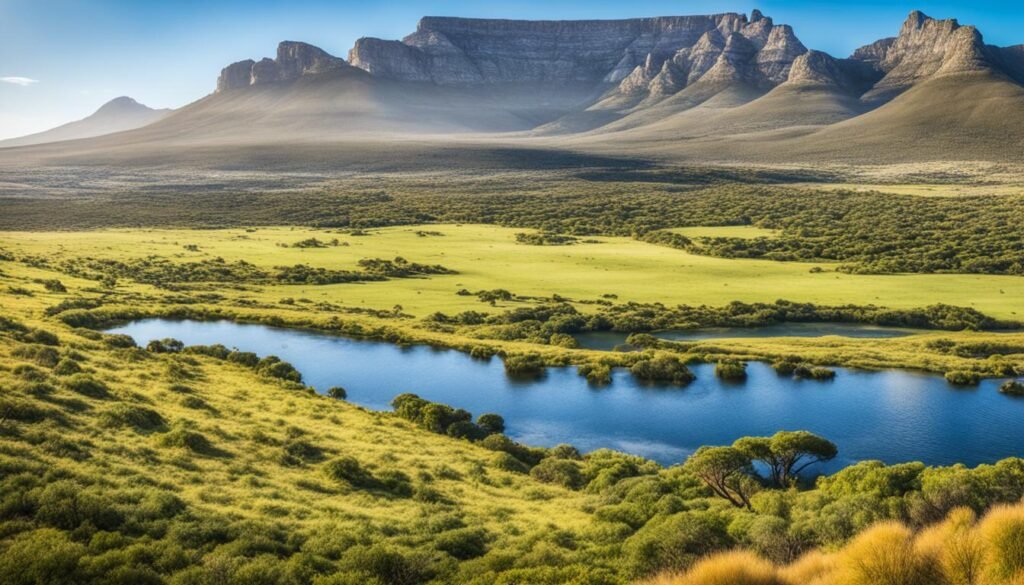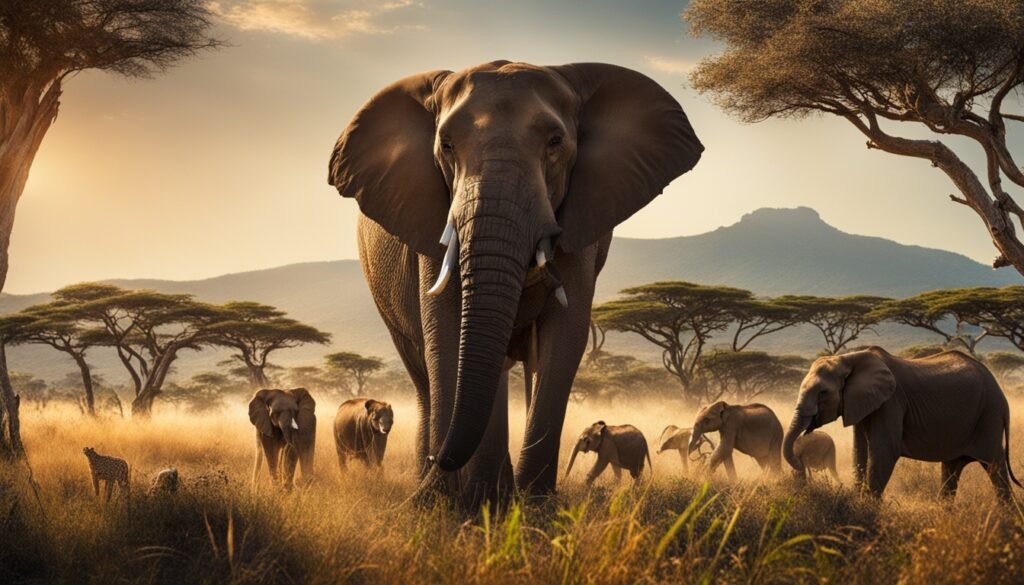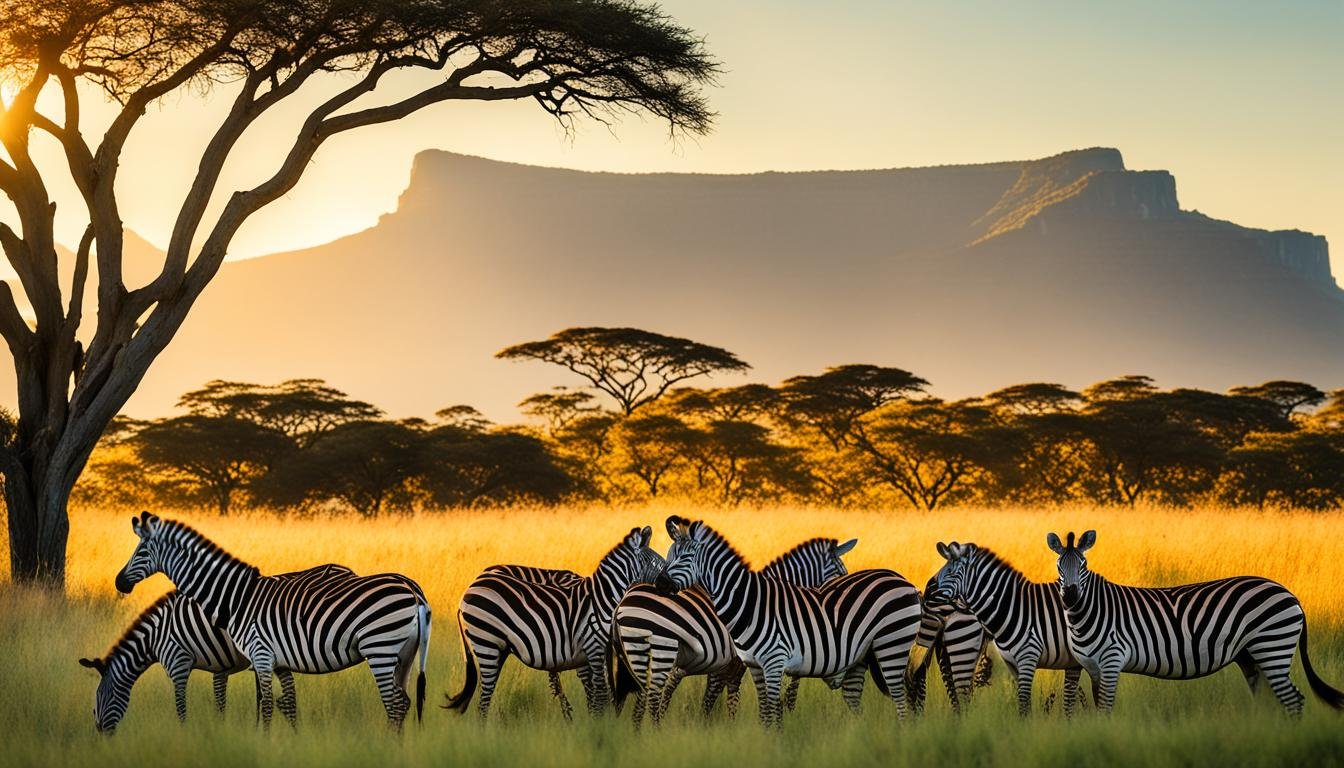Did you know that South Africa’s Western Cape province is home to over 9,000 different plant species, many of which are found nowhere else on Earth? This biodiversity hotspot is the center of African wildlife conservation efforts, with Cape Town serving as a vital gateway for visitors to explore the country’s stunning natural landscapes and participate in sustainable ecotourism initiatives.
Key Takeaways
- Cape Town, South Africa, is a hub for African wildlife conservation efforts, home to a diverse array of endemic and iconic species.
- The region faces various threats, including habitat loss, poaching, and climate change, which endanger the local wildlife.
- Sustainable ecotourism initiatives in Cape Town support local communities and wildlife protection programs.
- Visitors can explore the country’s natural landscapes and participate in conservation efforts during their stay.
- The city serves as a gateway for those interested in experiencing and contributing to African wildlife preservation.
Exploring Cape Town’s Wildlife Treasures
Cape Town, located in the Western Cape region of South Africa, is a true gem for nature enthusiasts. This vibrant city is surrounded by an abundance of biodiversity, making it a prime destination for wildlife conservation efforts. From the iconic Table Mountain National Park to the lush Kirstenbosch National Botanical Garden, the area is teeming with key biodiversity hotspots that harbor a diverse array of endangered species and captivating conservation initiatives.
Key Biodiversity Hotspots
The Table Mountain National Park, a UNESCO World Heritage Site, is a prime example of the region’s ecological richness. This protected area is home to over 2,200 unique plant species, many of which are found nowhere else on Earth. The park’s diverse habitats, ranging from fynbos shrublands to montane forests, provide a sanctuary for a variety of endangered species, including the Cape mountain zebra and the threatened African penguin.
Iconic Species and Conservation Efforts
Beyond the boundaries of the national parks, Cape Town’s wildlife treasures extend to the nearby Robben Island, a former prison island that now serves as a wildlife reserve. This unique ecosystem is a crucial stronghold for the endangered African penguin, whose populations have been dwindling due to a range of threats. Conservation efforts in the region focus on habitat restoration, anti-poaching initiatives, and community-based programs to ensure the long-term survival of these iconic species.
South Africa: African Wildlife Conservation Cape Town South Africa
South Africa stands as a global leader in African wildlife conservation, with its extensive network of national parks, private reserves, and community-based initiatives dedicated to protecting the country’s diverse ecosystems and the majestic creatures that call them home. Cape Town, the iconic city nestled along the southwestern coast, serves as a prominent hub for these conservation efforts, drawing visitors from around the world who seek to immerse themselves in the wonders of South Africa’s natural heritage.
From the iconic Big Five (lion, leopard, rhinoceros, elephant, and buffalo) to the unique fynbos plant biome, South Africa’s wildlife is a global treasure that requires ongoing stewardship and protection. The country’s national parks, such as the renowned Kruger National Park, work tirelessly to safeguard these species and their habitats, while private reserves and community-based initiatives complement these efforts, ensuring a holistic approach to conservation.

South Africa’s commitment to African wildlife conservation is evident in the numerous programs and initiatives that engage local communities, educate the public, and support scientific research. These efforts not only contribute to the preservation of South Africa’s natural heritage but also serve as a model for conservation practices across the continent, inspiring collaborative efforts and shared learnings that benefit wildlife and ecosystems throughout Africa.
Sustainable Eco-Tourism Initiatives
Cape Town and the surrounding regions have embraced sustainable eco-tourism as a means of supporting wildlife conservation and community development. Responsible wildlife encounters, such as guided safaris, wildlife walks, and marine life viewing, provide visitors with the opportunity to observe animals in their natural habitats while minimizing the impact on fragile ecosystems. These initiatives generate vital revenue that is reinvested into conservation efforts and community programs, empowering local stakeholders to be active participants in the protection of their natural resources.
Responsible Wildlife Encounters
Eco-tourism in Cape Town offers a range of responsible wildlife encounters that allow visitors to appreciate the region’s diverse fauna while prioritizing conservation. From guided safaris that track iconic species like the African elephant and the endangered Cape Mountain Zebra, to marine life viewing excursions that showcase the majestic whales and seals, these experiences are designed to educate and inspire visitors to become advocates for sustainable tourism and wildlife protection.
Supporting Local Communities
Sustainable eco-tourism initiatives in Cape Town have also played a crucial role in supporting local communities. The revenue generated from these programs is reinvested into community development projects, providing employment opportunities, educational resources, and infrastructure improvements that empower residents to be actively involved in the preservation of their natural heritage. By fostering a sense of ownership and pride, these community-based initiatives have become integral to the success of Cape Town’s wildlife conservation efforts.
Marine Life Conservation
The coastal waters of the Western Cape are a haven for a diverse array of marine life, including many endangered and endemic species. This region’s rich biodiversity boasts over 800 marine fish taxa, with a concerning 105 species facing various IUCN threat statuses. Conservation efforts in this area are crucial for protecting the long-term survival of these unique marine ecosystems.
Endangered Marine Species
Among the most critically endangered species found in these coastal habitats are the dageraad, eightgill hagfish, and seventyfour seabream. Additionally, the puffadder and brown shysharks are also listed as endangered. Preserving the health and integrity of these coastal environments is essential for safeguarding the future of these vulnerable marine creatures.
Conservation efforts in the region focus on employing various strategies to protect these endangered marine species and their delicate coastal habitats. By raising awareness, implementing sustainable fishing practices, and working to mitigate the impact of human activity, researchers and organizations are striving to ensure the long-term survival of these remarkable marine ecosystems.
Preserving Coastal Habitats
The coastlines of the Western Cape, including the renowned Garden Route and the rugged Overberg region, are home to a wealth of biodiversity. These coastal habitats, which include sandy beaches, rocky shores, estuaries, and kelp forests, provide critical ecosystems for a wide range of marine species. Conservation efforts in these areas focus on mitigating the impact of human activities, such as development, pollution, and unsustainable fishing practices, to ensure the long-term resilience of these fragile environments.
Protecting coastal habitats is crucial for marine conservation and preserving the region’s rich biodiversity. Researchers and conservation organizations work tirelessly to monitor the health of these ecosystems, implement sustainable management practices, and raise awareness about the importance of these fragile environments. By collaborating with local communities and stakeholders, they strive to strike a balance between human activities and the needs of the coastal ecosystems.
The restoration of degraded coastal habitats is another key focus area. Through habitat rehabilitation, invasive species removal, and the implementation of sustainable tourism practices, these efforts aim to revive the natural beauty and ecological functions of the region’s coastlines. By preserving the coastal habitats, we can ensure the long-term well-being of the diverse marine life that calls these areas home, while also safeguarding the livelihoods and recreational opportunities that depend on the health of these precious environments.
Anti-Poaching Strategies and Successes
South Africa, and particularly the Western Cape region, has been at the forefront of innovative anti-poaching strategies to combat the illegal wildlife trade. Wildlife reserves, such as the Table Mountain National Park and the Kgalagadi Transfrontier Park, play a crucial role in these efforts.
Role of Wildlife Reserves
These wildlife reserves employ specialized law enforcement teams, advanced technology, and collaborative international partnerships to track and apprehend poachers. Their dedicated, multifaceted approaches have led to significant successes in protecting endangered species and disrupting global poaching networks.

For instance, the Table Mountain National Park has implemented a comprehensive anti-poaching strategy that includes the use of drones, sniffer dogs, and intelligence-driven operations. This has resulted in a notable decrease in rhino poaching incidents within the park’s boundaries. Similarly, the Kgalagadi Transfrontier Park, which straddles the borders of South Africa and Botswana, has seen a decline in the illegal hunting of iconic species such as lions and leopards due to its rigorous anti-poaching measures.
These conservation success stories demonstrate the impact of a unified, proactive approach to protecting Africa’s wildlife heritage and combating the global threat of poaching. By leveraging the resources and expertise of these wildlife reserves, South Africa continues to set an example for effective anti-poaching strategies that can be replicated across the continent.
Volunteer Opportunities and Conservation Programs
Cape Town and the greater Western Cape region offer a range of exciting volunteer opportunities for those passionate about African wildlife conservation. Organizations like The Continents States University provide hands-on experiences in habitat restoration, species monitoring, community engagement, and eco-tourism development. Volunteers can choose to participate in short-term projects or longer-term placements, allowing them to make a tangible difference in preserving South Africa’s natural heritage.
Through these volunteer programs, individuals can immerse themselves in the local ecosystem and contribute directly to conservation efforts. Whether it’s assisting in the rehabilitation of endangered species, maintaining protected habitats, or engaging with community members to promote sustainable practices, these programs offer a unique chance to make a lasting impact on the region’s wildlife and environment.
Eco-tourism initiatives supported by these volunteer opportunities also play a vital role in generating revenue for local communities and funding further conservation initiatives. By participating in these programs, volunteers not only gain valuable experiences but also help drive the long-term sustainability of South Africa’s wildlife and ecosystems.
Cape Town’s diverse range of volunteer programs cater to individuals with varying interests and skill levels, making it accessible for anyone eager to contribute to the preservation of Africa’s natural wonders. Whether you’re a seasoned conservationist or a curious traveler, these opportunities provide a profound and rewarding way to connect with the local environment and make a meaningful difference.
Dates and Schedules for Wildlife Volunteering
Individuals passionate about wildlife conservation and eco-tourism have a wealth of opportunities to get involved in South Africa’s efforts. The Continents States University, an accredited institution in the United States, offers a unique membership-based tuition model that provides affordable online degree programs with flexible learning schedules and a competency-based education approach. This innovative university focuses on global career advancement and offers personalized academic support, experienced faculty, and scholarship opportunities to its students.
Important Dates and Events
The university’s wildlife volunteering program in South Africa features a range of start dates throughout the year, including January 8, January 22, February 5, February 19, and so on. Some start dates also offer additional staff workshops and overnight stays in the coastal village of St Lucia. These opportunities allow volunteers to immerse themselves in the local culture and ecosystem while contributing to the protection of endangered species and fragile habitats.
Whether you’re interested in hands-on conservation work, educational initiatives, or eco-tourism, the Continents States University’s wildlife volunteering program in South Africa provides a chance to make a meaningful impact on the region’s wildlife and conservation efforts. Mark your calendars and explore the upcoming events and dates to find the perfect opportunity to get involved.

Funding and Support for Conservation Efforts
The preservation of South Africa’s wildlife and natural habitats relies on the support of a network of local and international non-governmental organizations (NGOs) and charities. One such organization making a significant impact is the Wildlife ACT Fund, a non-profit trust dedicated to saving endangered wildlife and wild places from extinction.
Through the provision of time, expertise, and critical equipment, as well as the implementation of anti-poaching measures and community education programs, the Wildlife ACT Fund plays a vital role in driving conservation efforts across the Western Cape and the broader South African landscape. By collaborating with local communities, the organization ensures that conservation funding reaches the grassroots level, empowering individuals to become active stewards of their natural heritage.
Local NGOs and Charities
In addition to the Wildlife ACT Fund, there are numerous other local NGOs and charities dedicated to conservation funding and supporting wildlife protection in South Africa. Organizations like the World Wide Fund for Nature (WWF) South Africa and the Endangered Wildlife Trust work tirelessly to secure donations and resources to safeguard the country’s diverse ecosystems and iconic species.
These NGOs and charities play a crucial role in advocating for policy changes, engaging with policymakers, and fostering public awareness about the importance of wildlife conservation. By harnessing the power of community-driven initiatives and partnerships, they are able to amplify the impact of conservation funding and drive meaningful change on the ground.
Educational Initiatives and Community Outreach
Cape Town and the surrounding regions have made significant strides in developing educational initiatives and community outreach programs to foster a deeper understanding and appreciation for African wildlife conservation. These efforts involve partnerships with schools, local communities, and international organizations to raise awareness, promote environmental stewardship, and empower citizens to become active participants in the protection of their natural heritage.

By engaging people of all ages and backgrounds, these programs aim to cultivate a lasting culture of conservation that will safeguard South Africa’s precious ecosystems for generations to come. From interactive classroom workshops to community-led beach cleanups, the region’s conservation education initiatives are making a significant impact, inspiring locals and tourists alike to become champions of environmental protection.
Through partnerships with schools and universities, students are learning about the importance of biodiversity, the threats facing iconic species, and the critical role they can play in preserving their natural heritage. Community engagement programs, on the other hand, empower local residents to take ownership of their surroundings, fostering a sense of pride and responsibility for the land they call home.
These educational and outreach efforts are essential in building a sustainable future for African wildlife conservation in Cape Town and beyond. By nurturing a deep appreciation for the natural world, these initiatives are cultivating a new generation of environmental stewards who will continue to safeguard the region’s precious ecosystems for years to come.
Challenges and Future Outlook
Despite the remarkable progress made in African wildlife conservation in the Cape Town region, numerous challenges remain. Habitat loss, poaching, and the impacts of climate change continue to threaten the delicate balance of these ecosystems. The ongoing expansion of urban areas and agricultural development has led to the fragmentation and destruction of critical wildlife habitats, putting many species at risk.
Poaching, driven by the lucrative illegal wildlife trade, remains a significant threat to iconic species like the rhino, elephant, and pangolin. Organized criminal networks have become increasingly sophisticated, making it difficult for law enforcement and anti-poaching units to keep up. Additionally, climate change is altering weather patterns and disrupting the natural cycles that sustain these ecosystems, further exacerbating the challenges faced by conservation efforts.
However, the dedicated efforts of conservation organizations, government agencies, and local communities have laid the groundwork for a more sustainable future. By addressing the root causes of these issues, implementing robust anti-poaching strategies, and fostering environmental stewardship, the Western Cape is poised to remain a global leader in the protection and restoration of its unique and irreplaceable natural heritage.
Through collaborative initiatives, investment in green infrastructure, and the empowerment of local communities, the region can build resilience and adapt to the changing climate. By prioritizing sustainable eco-tourism and supporting alternative livelihoods, the Cape Town area can balance the needs of both wildlife and the human population. With continued commitment and innovative solutions, the future of African wildlife conservation in this remarkable region looks brighter than ever.
Conclusion
Cape Town and the Western Cape region of South Africa have emerged as a global center for African wildlife conservation. Through a comprehensive approach that combines sustainable ecotourism, community-based initiatives, anti-poaching strategies, and educational outreach, this vibrant city is leading the charge in safeguarding the continent’s diverse and invaluable natural resources.
As the world continues to confront the challenges of habitat loss, climate change, and the illegal wildlife trade, the ongoing efforts of conservation organizations, local communities, and eco-conscious travelers in Cape Town offer a glimmer of hope for the future of Africa’s magnificent wildlife. By fostering a deep respect and appreciation for the region’s biodiversity, these collective initiatives are making a significant impact on preserving the delicate balance of the ecosystem.
Moving forward, the continued collaboration between government, non-profit entities, and the public will be crucial in sustaining the momentum of wildlife conservation in Cape Town. With a steadfast commitment to environmental stewardship and community engagement, this remarkable city stands at the forefront of protecting Africa’s natural heritage for generations to come.
Source Links
- Wildlife Conservation Volunteering in Africa | Wildlife ACT – https://www.wildlifeact.com/
- Endangered Wildlife Conservation – https://www.podvolunteer.org/projects/endangered-wildlife-conservation
- Animal Conservation – Capenature – https://www.capenature.co.za/animal-conservation


